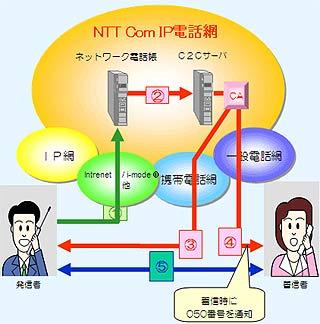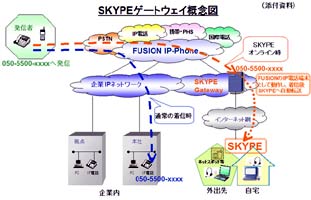 NTT Comm, part of telecom giant Nippon Telegraph and Telephone is muscling in on free IP services with an IP telephone and mobile phone hybrid package for corporate and retail customers. Subscription-based “Click-to-Connect,” or C2C, enables mobile handsets from any provider to connect to NTT’s IP network by dialing a 050 prefix. Users receive assigned phone numbers attached to the prefix and NTT manages the whole system on their i-mode and Internet network.
NTT Comm, part of telecom giant Nippon Telegraph and Telephone is muscling in on free IP services with an IP telephone and mobile phone hybrid package for corporate and retail customers. Subscription-based “Click-to-Connect,” or C2C, enables mobile handsets from any provider to connect to NTT’s IP network by dialing a 050 prefix. Users receive assigned phone numbers attached to the prefix and NTT manages the whole system on their i-mode and Internet network.
Internet telephony, that cheap and cheerful, occasionally fuzzy alternative to conventional phone calls, has been plagued by some of the same financing problems of Internet portals — how to turn a steady profit from a free or at least inexpensive service. NTT Comm’s plan surgically removes that pesky ‘R’ from free and creates a fee-based plan that works through business models already in place. Conservative Japanese companies unwilling to commit to unfamiliar IP protocols are comforted by that rock-solid NTT logo anchoring Click-to-Connect.
Company subscriptions to the IP service allow employees to use their own mobile phones for business-related calls — plus C2C also works on conventional phones, PHS and IP models. That frees companies from providing business-use phones to workers. Each company manages their corporate subscription via a dedicated Website. Corporate charges start at 1,050 yen per phone number for between 1-50 phones. For 500 phones or more, that charge drops to 787.5 yen. Over a fixed telephone line or IP telephone, a three-minute call will cost 8.4 yen; a one-minute call on a cell phone, about 18 yen or around 54 yen for three minutes. Savings could be as much as 30 percent compared to standard cellular rates which can charge as much as 90 yen for a short three-minute call. Retail rates have not yet been released.
 Costly Japanese domestic phone prices are looking to take a tumble with low-priced hybrid fixed-line/IP telephony services. The newest team-up pairs Japan’s Fusion Communications with Skype Technologies. Fusion’s patent-pending gateway technology takes incoming number-based calls and works with Skype’s database to route them to Skype IP telephony subscribers using the 050- prefix, similar to NTT Communications’ Click-2-Connect IP phone service, also using the 050 designation. Skype works with Windows, Mac OS X, Linux and PDAs using Pocket PC. Users typically connect through their PC. Is Skype, the no-cost free Net telephony provider, finally going to turn a profit?
Costly Japanese domestic phone prices are looking to take a tumble with low-priced hybrid fixed-line/IP telephony services. The newest team-up pairs Japan’s Fusion Communications with Skype Technologies. Fusion’s patent-pending gateway technology takes incoming number-based calls and works with Skype’s database to route them to Skype IP telephony subscribers using the 050- prefix, similar to NTT Communications’ Click-2-Connect IP phone service, also using the 050 designation. Skype works with Windows, Mac OS X, Linux and PDAs using Pocket PC. Users typically connect through their PC. Is Skype, the no-cost free Net telephony provider, finally going to turn a profit?

 NTT Comm, part of telecom giant Nippon Telegraph and Telephone is muscling in on free IP services with an IP telephone and mobile phone hybrid package for corporate and retail customers. Subscription-based “
NTT Comm, part of telecom giant Nippon Telegraph and Telephone is muscling in on free IP services with an IP telephone and mobile phone hybrid package for corporate and retail customers. Subscription-based “